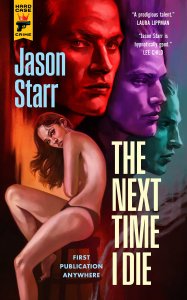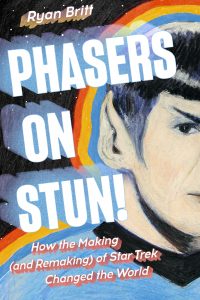Paul Di Filippo Reviews The Next Time I Die by Jason Starr
 The Next Time I Die, Jason Starr (Hard Case Crime 978-1789099515, trade paperback, 256pp, $14.95) June 2022.
The Next Time I Die, Jason Starr (Hard Case Crime 978-1789099515, trade paperback, 256pp, $14.95) June 2022.
I have been an aficionado of the Hard Case Crime line of mysteries ever since its debut in 2004. What great books they issue! But I confess that I tend to read only their reprint volumes, the classic, forgotten, vintage stuff. It’s just my quirk that I prefer the older goods. So when HCC publishes an original title, I nod my head sagely, glad that they are supporting a living writer, and move on. Oh, wait, I did read and review their first Stephen King acquisition, Joyland, as well as Max Allan Collins’s Seduction of the Innocent. But barring these exceptions, my narrow predilection is how I have been able to foolishly miss out on the work of Jason Starr, a writer with about two dozen titles to his name, several of them from HCC. However, when studying the HCC list for this year, I noticed that the new Jason Starr offering was pure science fiction. (This might very well mark their first-time foray into this genre.) Here was my perfect chance to break my run of nescience about Starr’s work. And I’m very glad I did. Starr’s newest is Cornell Woolrich meets Max Barry, a propulsive blend of speculation and gritty crime, with all elements sharing equal page time.
We open with a taut and poignant and uneasy domestic scene. Our lawyer protagonist, Steven Blitz, who will narrate his remarkable adventures himself, is working at home late one evening on a case. It is then that his wife Laura chooses to issue an acidic ultimatum: she wants a divorce, and wants Steven out of the house immediately. They dance back and forth for a while, but it’s no use. Steven has to leave.
It’s a cold and snowy night. He sets out for the refuge of his brother’s house, some distance away. He almost has an accident, but recovers safely. But then, in the parking lot of a convenience store, he meets his death as an innocent bystander in an incident of domestic abuse.
Well, since that account brings us to the end merely of Chapter One, we’d have a pretty short book unless death was not the final word. And it’s not. Steven awakens in a hospital bed, innocent of any fatal wound. Instead, he learns, his car did go off the road and he got a mild concussion. He’ll be fit to leave soon.
This news, naturally, is disturbing enough, contradicting all his memories. But then his loving and worried wife Laura arrives, with a daughter Steven never had.
It is at this juncture that Starr takes an interesting narrative tack which a genre SF writer such as Max Barry — in his utterly resonant The 22 Murders of Madison May — would totally exclude. I refer to the metafictional awareness of the protagonist. Steeped as our culture is in fantastika these days, a writer almost feels obligated to have their hero acknowledge the similarity of what’s happening to him to some fictional touchstone. “Oh, yeah, this is just like Jurassic Park!” But Starr doesn’t take that route. Steven is more of a practical-minded, non-literary fellow. He has no cultural benchmarks for concepts like the multiverse or alternate lives, and has never given such things any thought. This is perhaps a more realistic approach to an Everyman character’s reactions. And it allows for some dramatic incidents as Steven tries to unravel what’s happening to him while still staying sane.
And so as the evidence starts to pile up that this is not his original world — USA President Al Gore; no 9/11 disaster; Blockbuster still a flourishing chain — Steven starts to feel he’s been given a second chance at life. In this continuum he’s richer, has a loving wife and daughter, and has survived brain cancer. What’s not to be happy about?
Of course, Starr realizes such an outcome would be unthinkably bland and milquetoast. So he diabolically rolls up his sleeves and reveals that this Steven Blitz is a thorough jerk and cad and egomaniac. He’s been having multiple extramarital affairs. And one of these liaisons has led to a murder. Oh, yes, our Steven also has the bright idea to look up a fellow who was a serial killer back in the native continuum.
Soon Steven’s life begins to spiral down the noir drain, leaving us with just one question: what happens when he dies again?
Starr’s worldbuilding of the counterfactual continuum is very delightful. Far from a dystopia, it’s actually a better world than ours. I count the absence of Twitter alone as a major draw. His depiction of Steven’s domestic and extra-domestic mundanities is excellent. And of course the conveying of Steven’s near-descent into paranoid confusion is well done too. Issues of fatedness versus free will are both embodied and theorized about
Ultimately, Starr’s blend of James M. Cain with a kind of Keith Laumeresque adventure of identity in other dimensions is a swift-moving and entrancing recipe.
Perhaps Hard Case Crime will begin to publish more SF-crime hybrids of this stature — if not in this world, then in another!
 While you are here, please take a moment to support Locus with a one-time or recurring donation. We rely on reader donations to keep the magazine and site going, and would like to keep the site paywall free, but WE NEED YOUR FINANCIAL SUPPORT to continue quality coverage of the science fiction and fantasy field.
While you are here, please take a moment to support Locus with a one-time or recurring donation. We rely on reader donations to keep the magazine and site going, and would like to keep the site paywall free, but WE NEED YOUR FINANCIAL SUPPORT to continue quality coverage of the science fiction and fantasy field.
©Locus Magazine. Copyrighted material may not be republished without permission of LSFF.







